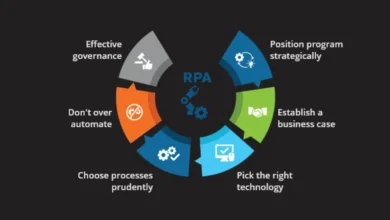The Changing Landscape of Hiring in Banking and Finance: Key Trends Shaping the Future

The banking and finance industry is undergoing a significant transformation, driven by technological advancements, regulatory changes, and shifting market dynamics. These changes are having a profound impact on hiring strategies, forcing financial institutions to reevaluate their approach to talent acquisition and development. This article explores the key trends that are reshaping recruitment in the banking and finance sector.
Contents
- 1 Digital Transformation Drives Demand for Tech Skills
- 2 Global Talent Acquisition Becomes a Priority
- 3 Regulatory Compliance and Risk Management Gain Prominence
- 4 The ESG Revolution Creates New Roles
- 5 Competition with Fintech Drives Innovation-Focused Hiring
- 6 Diversity and Inclusion Become Key Priorities
- 7 Continuous Learning Becomes a Core Value
- 8 Conclusion
Digital Transformation Drives Demand for Tech Skills
One of the most significant trends impacting hiring in finance is the ongoing digital transformation of the industry. As banks and financial institutions increasingly rely on technology to deliver services and manage operations, the demand for tech-savvy professionals has skyrocketed.
Financial institutions are actively seeking candidates with expertise in areas such as:
- Artificial intelligence and machine learning. These technologies are being applied to risk assessment, fraud detection, and personalized customer experiences.
- Blockchain. As blockchain continues to disrupt traditional banking, specialists are needed to explore its applications in cross-border payments, smart contracts, and secure record-keeping.
- Data analytics. Data scientists are in high demand to extract insights from vast amounts of financial data, enhancing decision-making processes and identifying new business opportunities.
- Cloud computing. With the shift towards cloud-based infrastructure, professionals who can manage cloud migrations and optimize cloud-based financial applications are crucial.
- Cybersecurity. As digital threats evolve, cybersecurity experts are essential to protect sensitive financial data and prevent fraud.
This shift is not only creating new roles but also transforming existing ones. Traditional finance professionals are increasingly expected to have a basic understanding of these technologies and how they impact the industry.
Global Talent Acquisition Becomes a Priority
The rise of remote work and the globalization of finance have expanded the talent pool for financial institutions beyond geographical boundaries. This trend has led to a significant shift in hiring strategies, with many banks now looking to hire international employees.
To facilitate this global approach to talent acquisition, financial institutions are:
- Leveraging advanced collaboration tools to ensure seamless communication among geographically dispersed teams.
- Developing strategies to manage work across different time zones, ensuring 24/7 coverage for critical operations.
- Implementing cross-cultural training programs to facilitate the successful integration of international hires.
- Exploring new ways to attract and retain global talent in a competitive market.
This global approach to hiring allows banks to access specialized skills that may be scarce in local markets, bring diverse perspectives to their teams, and establish a presence in new markets without physical expansion.
Regulatory Compliance and Risk Management Gain Prominence
The financial industry operates in an increasingly complex regulatory environment. As regulations evolve and new risks emerge, banks are placing greater emphasis on hiring professionals who can navigate these challenges effectively.
Key areas of focus include:
- Regulatory technology (RegTech). Banks are seeking experts who can implement and manage RegTech solutions to streamline compliance processes.
- Anti-money laundering (AML). With increased focus on preventing financial crimes, specialists in AML and Know Your Customer (KYC) procedures are in high demand.
- Data privacy. The implementation of regulations like GDPR has created a need for experts who can ensure compliance with data protection laws.
Additionally, the growing threat of cyberattacks has made cybersecurity a top priority. Financial institutions are building dedicated teams to respond to cyber incidents and conduct regular security assessments.
The ESG Revolution Creates New Roles
Environmental, Social, and Governance (ESG) considerations are rapidly becoming central to the banking and finance industry. This shift is creating new roles and changing the skill sets required in traditional finance positions.
Banks are actively recruiting professionals with expertise in:
- Sustainable investing.
- Impact measurement and reporting.
- Climate risk assessment.
- ESG integration in financial products.
As investors and regulators place increasing importance on sustainability and social responsibility, banks that prioritize hiring and developing talent in these areas will be better positioned to meet market demands and regulatory requirements.
Competition with Fintech Drives Innovation-Focused Hiring
The rise of fintech companies has intensified competition for skilled professionals in the finance sector. To compete effectively, traditional banks are adapting their hiring strategies to attract innovative thinkers and create more agile work environments.
This includes:
- Establishing innovation labs and hiring entrepreneurs-in-residence to drive internal innovation.
- Recruiting professionals skilled in agile methodologies to lead rapid development of new financial products.
- Hiring user experience (UX) and user interface (UI) designers to create intuitive digital banking platforms.
- Seeking API specialists to facilitate seamless connections with third-party services in the open banking ecosystem.
By adopting some of the cultural and operational practices of tech startups, banks are positioning themselves as exciting and dynamic places to work for the next generation of finance professionals.
Diversity and Inclusion Become Key Priorities
The banking industry is recognizing that diverse teams lead to better decision-making, improved customer service, and enhanced innovation. As a result, diversity and inclusion have become key priorities in hiring strategies.
Financial institutions are implementing comprehensive diversity and inclusion initiatives, including:
- Partnering with diverse professional networks to expand candidate pools.
- Implementing unconscious bias training for hiring managers and interviewers.
- Establishing mentorship and sponsorship programs to support career development for employees from diverse backgrounds.
- Developing inclusive leaders who can effectively manage diverse teams.
Banks that successfully implement these strategies benefit from a wider range of perspectives, enhanced creativity, and improved ability to serve diverse customer bases.
Continuous Learning Becomes a Core Value
The rapidly evolving nature of the finance industry requires professionals who can adapt quickly to new technologies, regulations, and market conditions. Banks are increasingly prioritizing candidates with a demonstrated commitment to lifelong learning.
To foster a culture of continuous learning, financial institutions are:
- Investing in comprehensive e-learning platforms and partnering with educational institutions.
- Implementing cross-functional training programs to develop well-rounded professionals.
- Organizing internal innovation challenges to encourage creative problem-solving.
- Offering financial support for employees to pursue relevant certifications and advanced degrees.
By emphasizing adaptability and learning agility, banks are building workforces that can navigate future challenges and capitalize on emerging opportunities.
Conclusion
The future of hiring in banking and finance is being shaped by a complex interplay of technological advancements, global market dynamics, regulatory pressures, and changing societal expectations. Financial institutions that can effectively adapt their recruitment strategies to address these trends will be better positioned to build resilient, innovative, and diverse teams.
By embracing global talent acquisition, prioritizing technological and ESG skills, fostering innovation, and committing to diversity and continuous learning, banks can create workforces that are not only prepared for the challenges of today but also poised to shape the future of finance. As the industry continues to evolve, the ability to attract, develop, and retain top talent will be a key differentiator for success in the competitive landscape of banking and finance.
Some institutions are even exploring the use of global EOR services to streamline their international hiring processes, further expanding their access to global talent pools and enabling them to navigate the complexities of international employment laws more effectively.




